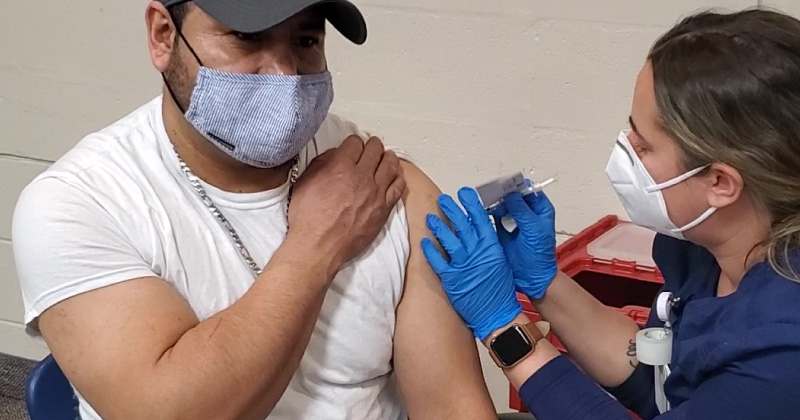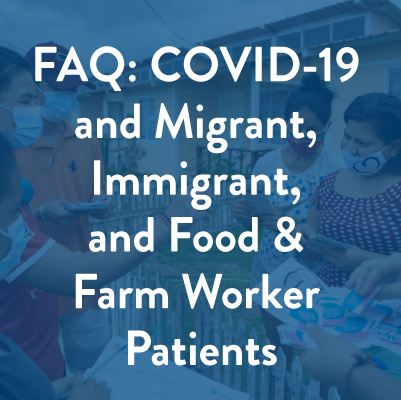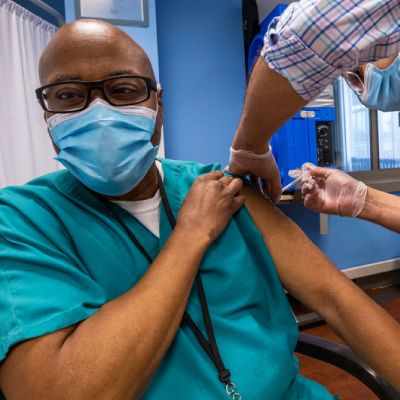- Who We Are
- Clinician Employment
- Publications
- Witness to Witness (W2W)
- Kugel & Zuroweste Health Justice Award
- Your Voice Matters: Photovoice Project
Tue, 06/22/2021 | by MCN Admin


At the US-Mexico border, the pace of vaccination has depended on which side of the wall one is on. In the US, available vaccines have outstripped the number of people interested in vaccinations. In Mexico, however, vaccines continue to be hard to access. As the pandemic has worn on, Carlos González Gutiérrez, the Consul General of Mexico in San Diego, California, saw an opportunity to build a collaboration to ease the need for vaccines among Mexican workers at Tijuana maquiladoras – factories functioning directly on the other side of the border -- while alleviating oversupply at San Diego’s health department, which would improve public health on both sides of the border in the two highly connected cities. Consul González Gutiérrez heads up not just the Consulate, but the programs within, including the Ventanilla de Salud, or Window to Health, a program designed to provide health services and access to Mexican nationals who visit the Consulate. Each Consulate around the US has a Ventanilla de Salud that provides health education, attempts to link visitors to needed care, and hosts health fairs that offer on-site vaccinations and screenings, and more. In May, Consul González Gutiérrez worked with the San Diego Health Department to establish an initiative for unused vaccines. He discovered that, like many towns across the country, San Diego had more doses than needed. He offered an idea: if he could find workers to receive the vaccines, would the department donate 10,000 doses of the one-shot Johnson & Johnson/Janssen for his use? The Health Department agreed.
“Consul González Gutiérrez has long understood the important role that the Consul General can play for the Mexican community,” said Deliana Garcia, Migrant Clinicians Network’s Director of International Projects and Emerging Issues, and a colleague of Consul González Gutiérrez. “His efforts have always included coalitions of partners with a shared concern.”
Consul González Gutiérrez then reached out to the University of California, San Diego’s school of nursing to recruit a team of students to administer vaccinations. The university quoted him the price of $60 per shot for the necessary supervision. Finally, he turned to the maquiladoras, clothing manufacturing plants that line the US-Mexico border, in Tijuana. Factory workers by and large have not had access to vaccination in Mexico. Six factory owners joined the effort, agreeing to pay the cost of administration of vaccines for 9,000 of their workers – and subsidize the cost for an additional 1,000 Border Control workers who had yet to receive vaccines.
He then approached Customs and Border Patrol. He arranged for a temporary clinic to be erected on a closed footbridge running across the border. The nurses, vaccinations in hand, would meet the maquiladora workers at the center of the bridge, and vaccinate right there on the border.
Since the collaboration began, almost 22,000 people have been vaccinated – keeping border towns safe from COVID-19 with no cost to the US taxpayer.
“This is the first cross-border agreement we have had. This is surely going to grow a lot,” said Marcelo Ebrard, Foreign Relations Secretary, to US News & Report. “We plan to replicate this all along the border.”
The incredible collaboration ensures the health of residents on both sides of the border. “Worker health is public health, and any initiative that can bring the vaccine for COVID-19 to a large group of workers is a major success,” said Laszlo Madaras, MD, MPH, Chief Medical Officer for MCN. “It is inspiring to see what can happen when people come together for the common good.”
Got some good news to share? Contact us on our social media pages above.
Return to the main blog page or sign up for blog updates here.







